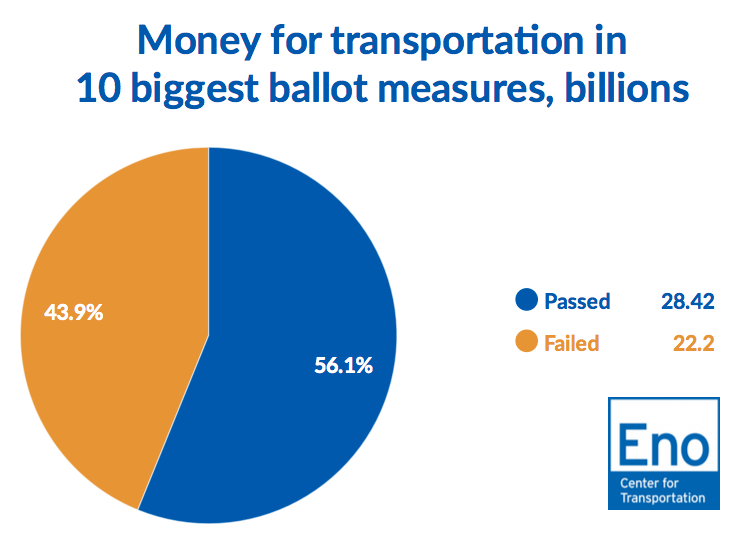Updated December 3, 2018
With San Mateo County’s Measure W squeaking by with a win, voters have now approved six of the 10 largest transportation ballot measures by dollar amount this Election Day, with four failing. Eno continues its full analysis of the 300+ transportation ballot measures and will release complete findings once available.
Looking at the 10 biggest transportation ballot measures, voters said yes to roughly $28.42 billion in new transportation funding, or 55.3 percent of the $50.63 billion at stake across the 10 measures. $22.2 billion, or 43.9 percent of the total, was rejected (most of which was two Colorado propositions).

(This list does not include California’s Proposition 6, which would have repealed the state’s fuel tax increases, as it did not put any new money before voters. That proposition failed, meaning the tax increase stands. One study found repeal would have cost the state $100 billion over 20 years, far more than any of the other measures considered on Election Day.)
Measures that Passed
The two biggest ballot measures that passed were both in Florida. In Broward County, voters approved a one-penny transportation sales surtax which will raise $15.63 billion over the 30-year life of the increase, making it the largest sales tax passed in the nation this Election Day. The revenue will be used for traffic signal synchronization, more bus routes, and repaved streets. In Hillsborough County, voters also approved a penny sales tax increase that will raise $8.28 billion over 30 years. Fifty-four percent of that amount will go towards road improvements, while 45 percent will go towards transit (split about evenly between bus transit and transit using dedicated rights of way, such as rail). Voters in both counties had rejected sales tax increases for transportation in previous elections.
In California, San Mateo County finally announced in late November that Measure W, a half-cent sales tax increase to fund highway and local road improvements, grade-separation along the Caltrain tracks, and other multimodal programs, passed. This one was a nail-biter: the measure needed two-thirds approval (66.67 percent), and it passed with about 66.85 percent. In the same state, Marin County voters passed Measure AA, which renews a half-cent sales tax surcharge for 30 more years. That measure will raise $810 million for Highway 101 and local road improvements, fund school bus service, and provide local transit. The measure needed two-thirds support to be approved; it received 74 percent of the vote.
Michigan voters decided to legalize and tax recreational marijuana. While transportation was surely not the most salient issue for voters, the measure does earmark roughly 35 percent of proceeds from the 10 percent excise tax on marijuana for road and bridge repair and maintenance. That could mean roughly $700 million for infrastructure over 20 years.
Lastly, in Texas, Collins County voters approved Proposition A, which allows the county to issue $600 million in bonds for limited-access roadway projects, with roughly 68 percent of the vote. (The county also approved Proposition B, which allows bond issuance for arterial roads, but at $140 million that did not break into the top 10 biggest measures.)
Measures that Failed
In one of the biggest transportation news items of the night, Colorado voters rejected both Prop 109, which would have issued $3.5 billion in bonds for just road improvements, and Prop 110, which would have raised the sales tax for 20 years, bringing in $15.3 billion for road and multimodal improvements. Both failed by a similar 40-60 margin. (This week’s ETW will feature an in-depth look at the two Colorado measures.)
Voters in Missouri rejected Prop D, which would have raised the gas tax by 10 cents to raise $2.46 billion for transportation, as well as fund some of the State Highway Patrol’s functions with the gas tax, thereby freeing up state DOT funding for other programs. The vote in Missouri was closer than in Colorado: 54 percent said no to the increase. The state’s gas tax will instead remain at 17 cents per gallon, where it was set in 1996.
Finally, Washington’s carbon fee initiative failed 56-44. Some of the revenue from the fee ($918 million over 20 years) would have gone to transportation projects that reduce carbon emissions, such as zero-emission vehicle infrastructure. Similar to the Michigan marijuana measure, it is unlikely that transportation was on voters’ minds as they cast their ballots, but nonetheless, money that would have gone toward transportation was rejected as the carbon fee went down.
Ten Biggest Transportation Ballot Measures by Dollar Amount
- Broward County, FL: Transportation sales surtax ($15.63 billion) PASS
- Colorado: Prop 110 ($15.334 billion) FAIL
- Hillsborough County, FL: No. 2 Referendum ($8.28 billion) PASS
- Colorado: Prop 109 ($3.5 billion) FAIL
- Missouri: Prop D ($2.46 billion) FAIL
- San Mateo County, CA: Measure W ($2.4 billion) PASS
- Washington: Carbon fee initiative ($918.314 million) FAIL
- Marin County, CA: Measure AA ($810 million) PASS
- Michigan: Marijuana legalization and taxation ($700 million) PASS
- Collin County, TX: Prop A ($600 million) PASS




